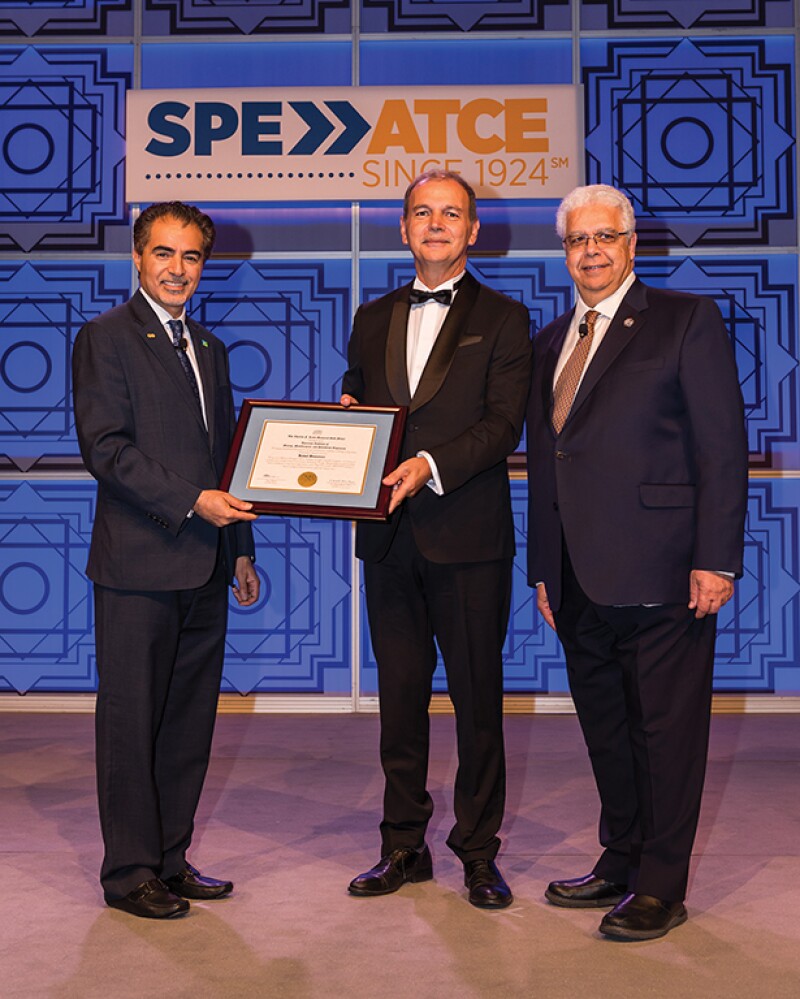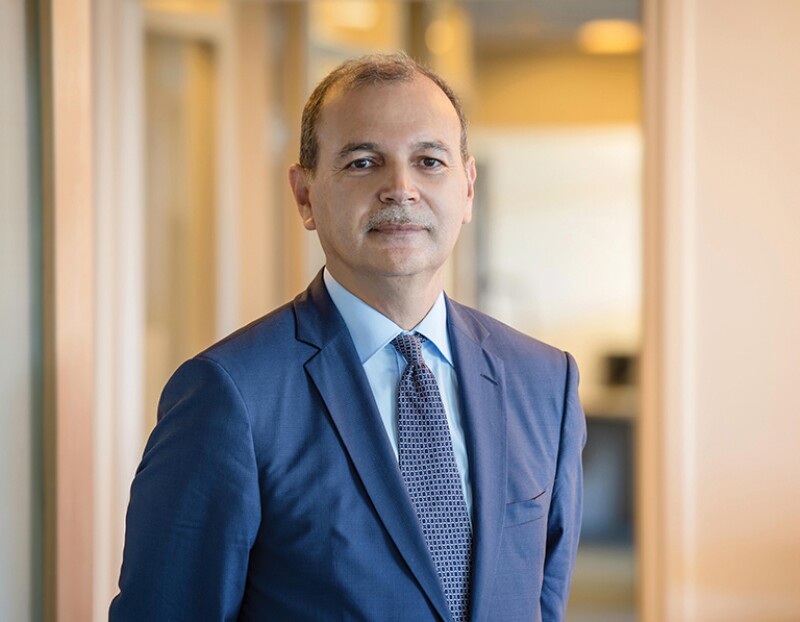Kamel Ben-Naceur is CEO of Nomadia Energy Consulting, where he advises on sustainable energy policies and global and regional energy economics and outlooks. He has worked as the chief economist for a major oil and gas company and for an oilfield services company.
Ben-Naceur has also worked as a director of the International Energy Agency and as the industry, energy, and mines minister for the Tunisian government.
He has chaired several SPE global committees, including Business Management and Leadership, the International Forum Series, and CO2 Capture, Utilization, and Storage. He has also taught several SPE courses on global energy and strategic thinking and planning. He was technical director for the Management and Information discipline on the SPE International Board of Directors from 2008 to 2011. Ben-Naceur was also an SPE Distinguished Lecturer during the 2009–2010 season and received an SPE Distinguished Member Award and SPE Distinguished Service Award in 2014, the AIME Charles F. Rand Memorial Gold Award in 2019, and the 2020 Sustainability and Stewardship in the Oil and Gas Industry Award.
He has coauthored more than 150 publications and 17 books.
Ben-Naceur holds the Agrégation de Mathématiques degree from the École normale supérieure and a master’s degree in engineering from École Polytechnique in Paris.
What key issues will you emphasize as 2022 SPE President?
Our industry, along with many other economical sectors, has experienced a major impact from the pandemic. The magnitude of the drop in oil demand in 2020, both in absolute and relative terms, is unprecedented. It led also to a major reduction in oilfield investment activity around the world, in the order of 30% compared to pre-COVID-19 levels. The fast-track development of vaccines and their availability, even though progress is still required to ensure that they are distributed fairly around the world, is raising hope that the worst may be behind us. SPE members have also been impacted in their ability to meet at technical conferences and exhibitions and participate in workshops or forums.
As 2022 SPE President, the theme I wish to develop is the “sustainable recovery” for our industry and for SPE. The industry has experienced in 2020–2021 a major loss of valuable employees ranging from young professionals to senior members. This has followed a major downcycle in 2014–2015.
After a 30% drop in Capex in 2020 compared to 2019, 2021 should see a modest recovery in activity (6–8% increase). The next year should welcome a 10–12% activity surge, providing an increase in employment opportunities for our members in transition, as well as for our student members.
Barring new negative developments in the pandemic, the recovery in activity should strengthen to reach pre-COVID levels by 2025, albeit 15–20% below the level that was expected before. The recovery of demand and activity should also be linked to a more sustainable trajectory of energy demand and supply.
Sustainability will be my second area of focus, with SPE having already engaged significantly. I had the opportunity to participate in the startup of the SPE GAIA Sustainability Program, which is now developing into many different directions, thanks to the efforts of SPE volunteers. 2019 SPE President Sami Al-Nuaim had put sustainability at the heart of his presidency, and I am pleased to see several of his initiatives materialize.
The third area of focus will be a gradual restart of physical meetings, where we will transition with the increase of hybrid (in-person/virtual) events, which is eagerly anticipated by our members.
The fourth area of focus is related to the development of the new SPE Strategic Plan.
Last but not least, is the proposed merger between SPE and the American Association of Petroleum Geologists (AAPG).
What do you identify as the challenges and opportunities for SPE members as the energy transition progresses?
The environmental footprint of the current energy mix is not sustainable and needs to evolve. The emissions footprint associated with the production, transformation, and use of energy is too high, leading to potentially dramatic negative consequences on the world’s ecosystems. The use of energy could also be reduced significantly by adopting adequate efficiency and reuse practices.
Many scenarios have been developed by organizations such as the International Energy Agency, major oil and gas companies, and other companies and institutions. Several trajectories exist for sustainable energy systems and they will depend on the willingness of the majority of countries (and especially the major consumers) to adopt new policies to curb emissions.
Oil and gas represent nearly 56% of the primary energy mix today, and demand for both sources following the post-COVID-19 pandemic recovery will remain sustained. Most scenarios project an increase in natural gas demand, while investments are required to sustain oil demand and avoid supply shortages. While oil demand for transport, especially for light-duty vehicles, may see a decline because of the increased electrification of vehicles, the need for oil in industrial applications such as petrochemicals and fertilizers will remain sustained.
There has recently been a major improvement in the environmental footprint of shipping with the use of cleaner fuels; the aviation sector will require decades to move to new transport fuels. Natural gas use will expand, especially in industrial applications, in the generation of blue hydrogen and as an alternative to coal in power generation. Upstream investments will likely need to be increased compared to today’s level to meet the world’s requirements.
Extreme decarbonization scenarios all require a significant ramp-up of technologies such as CO2 capture, utilization, and storage (CCUS), which should increase by two orders of magnitude in the next 2 decades with respect to the volumes of CO2 being injected. That alone will require the talent of many subsurface practitioners and provide opportunities for our current and future members. Other areas include hydrogen, which is expected to ramp up to more than 10% of final energy use, geothermal, and offshore wind.
Which regions show the greatest recovery from the recent downturns in the industry in terms of exploration and production?
In 2020, the regions that experienced the largest relative impact on upstream activity were North America and Africa. In 2021, Asia Pacific and South America should see recovery back near the pre-COVID levels, followed by the Middle East, the Former Soviet Union, and Europe. North America and Africa will take longer to recover.
What do you see as SPE’s role in guiding our members into a sustainable future?
SPE began the process of defining its new Strategic Plan last month with additional circumstances to consider compared to previous strategies: the impact of COVID-19, the drive toward energy transition, and the potential merger with AAPG.
The process involves the SPE Board of Directors and high-level executives in the industry to set the stage and understand their expectations of a professional society. We will be communicating to our members the outcome of this Strategic Plan in 2022. Our intent is to keep providing value to our members through traditional communication vectors, increase the incorporation of digital technologies, and expand our domains that are peripheral to our industry such as CCUS, hydrogen, and geothermal energy.
SPE has obviously been battered by the pandemic restrictions on travel and in-person events. How are we recovering so far and when do we expect to be able to hold more events?
Fiscal year 2021 was the most difficult year in SPE’s history as revenue from conferences and technical exhibitions was nearly absent. We would like to acknowledge the great effort by the SPE executive team and the SPE Board Finance Committee to reduce the impact. Further, we are grateful for the different contributions received.
We also benefited from a strong performance of the reserve funds in the financial markets. We expect in 2022 to ramp up physical events, including the International Petroleum Technology Conference, the Middle East Oil and Gas Show and Conference, Offshore Europe, the Offshore Technology Conference, and the Annual Technical Conference and Exhibition. We will be closely monitoring the evolution of requirements by host countries and our corporate organizations.
What is the status of the potential merger of AAPG and SPE? Why does the merger make sense for SPE and its members?
In May 2021, the SPE Board of Directors and the AAPG Executive Committee unanimously agreed on an exploration of the benefits and opportunities of a possible merger of the two organizations. The merger would reflect this interdisciplinary approach and open new opportunities for education, community, and knowledge resources that are best positioned to be successfully delivered in a new, unified organization. As changes in the industry accelerate, a consolidated organization would be the professional community of choice for a generation of professionals and students who are committed to driving long-term change across the energy sector.
AAPG and SPE both recognize that oil and natural gas will continue to be essential to meet the world’s energy needs, and the combined membership will contribute substantially to assuring reliable and affordable future energy supplies. The knowledge, skills, and abilities of the new organization would enable its members to accelerate the uptake of new technologies such as digitization and will also be essential to emerging areas such as CCUS, hydrogen energy, and novel geothermal solutions.
Such a merger would be the largest in the history of both organizations, and teams from both Societies have been working to explore the options for such a new entity that would meet the expectations of the combined memberships. This involves the definition of a common mission and vision, and we are starting from an already close alignment. The discussion also includes governance requirements. A proposal will be made for the vote of the SPE Board of Directors and the AAPG Executive Committee in September/October. If the proposal is accepted, the teams would then move to a formal merger process, leading to a general member vote in March/April 2022.
Communication to our members is essential to get their feedback, expectations, and issues, and we look forward to a participative effort to define together the future of our Societies.\

What advice do you have for students and Young Professionals?
The world requires energy for its development, and today the needs of hundreds of millions of people that lack access to electricity or to modern cooking are not being met. For the sake of sustainability and to leave an enduring legacy to the upcoming generations, we need to change the way we produce and use energy. In the generation of petrotechnical members with whom I started, we have participated in the development of game-changing technologies, such as computer use for geological and geophysical and reservoir modeling, horizontal wells, intelligent completions, 3D and 4D seismic, deepwater developments, unconventionals, LNG, CCUS, satellite monitoring of emissions, and many others. Such technologies have enabled extraordinary accomplishments and vastly increased the amount of hydrocarbon resources. The opportunities created by emerging areas such as digitization, quantum computing, nanotechnologies, genetic engineering, and 3D printing are immense, enabling our industry to increase recovery with enhanced safety and lower costs. Very few industries have such a wide range of domains, and I encourage our members to keep themselves informed through SPE’s knowledge portals, conferences, and forums.
Any other thoughts you’d like to share?
2021 has been a tough year for our industry and for SPE. I would like to acknowledge the great work done by the SPE staff, who have adapted rapidly to new ways of interacting with our members (through webinars, virtual Distinguished Lecturers, etc.) while focusing on the financial health of the organization. The previous SPE Board of Directors under the leadership of 2021 SPE President Thomas Blasingame did an outstanding job of leading SPE through the storm created by the pandemic. I want also to thank all our volunteers throughout the world and congratulate our 2021 award recipients, Distinguished Lecturers, and SPE committee members.


